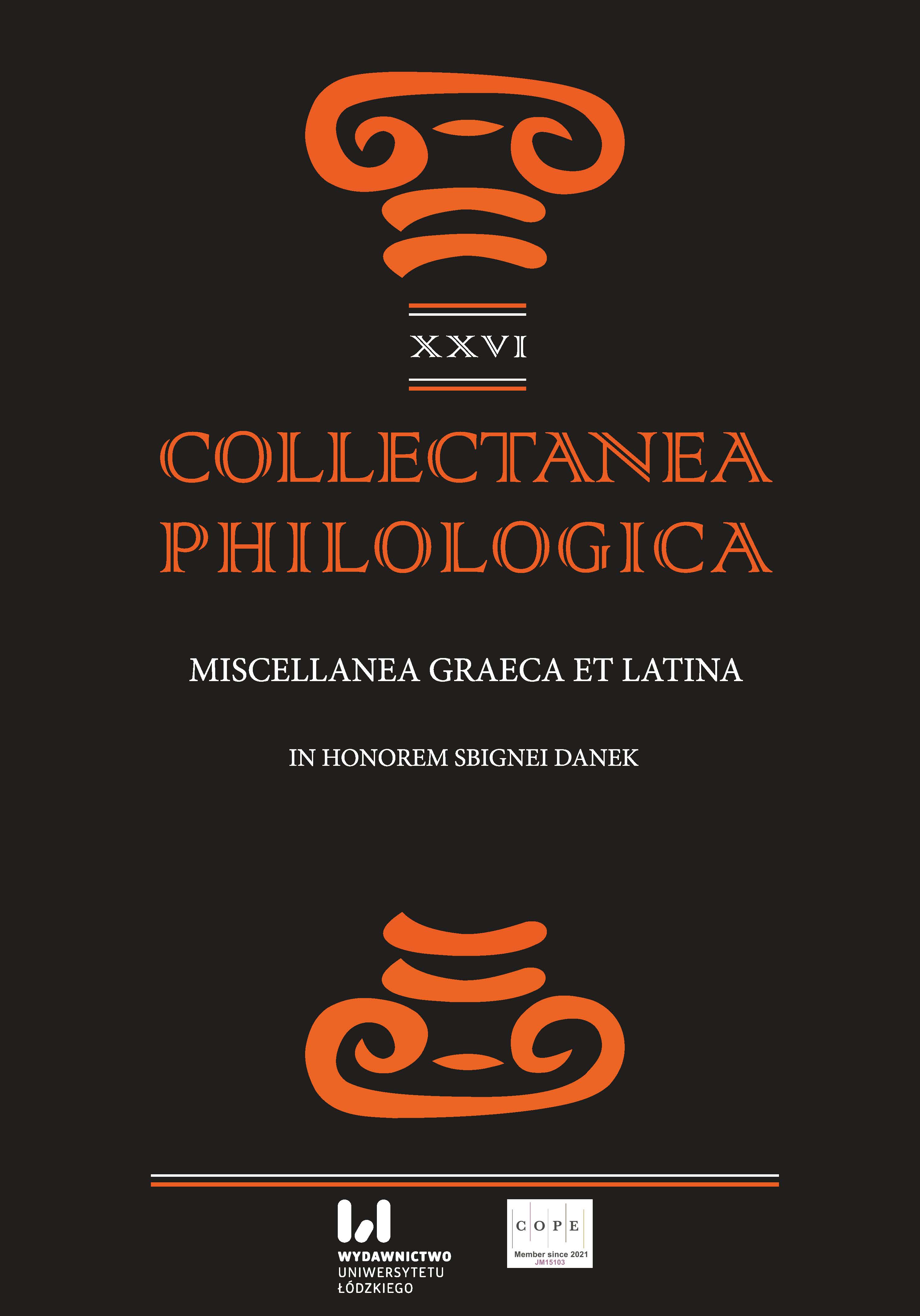Horace on Diseases
DOI:
https://doi.org/10.18778/1733-0319.26.10Słowa kluczowe:
Horacy, medycyna, medycyna rzymska, choroby, zdrowie, starożytny RzymAbstrakt
Quintus Horatius Flaccus, vividly portrayed for us in his works both a picture of contemporary society and the world of his convictions and beliefs. Among the many researched issues in his work, there are some that still need to be addressed. These include references of a medical nature. The purpose of this article is to point out numerous of Horace’s medical references which give clues as to what health problems plagued Augustan Rome in particular.
Bibliografia
Clasen, T.F., Bastable, A. (2003). “Faecal contamination of drinking water during collection and household storage: the need to extend protection to the point of use”. Journal of Water and Health 1, 2: 1–7.
Google Scholar
DOI: https://doi.org/10.2166/wh.2003.0013
Dirckx, J.H. (1992). “Horace and Medicine”. Am. J. Dermatopathol. 1992. 14(6): 576–581. https:// doi.org/10.1097/00000372-199212000-00018.
Google Scholar
DOI: https://doi.org/10.1097/00000372-199212000-00018
Gowers, E. (1994). Horace, Satires 1.5 an inconsequential journey. In: Proceedings of the Cambridge Philological Society (Second Series). Cambridge: Cambridge University Press 39:48–66. https://doi.org/10.1017/S0068673500001723.
Google Scholar
DOI: https://doi.org/10.1017/S0068673500001723
Gowland, R.L., Garnsey, P. (2010). Skeletal evidence for health, nutritional status and malaria in Rome and the empire. In: H. Eckhardt (ed.). Roman Diasporas: Archaeological Approaches to Mobility and Diversity in the Roman Empire. JRA Suppl. 78: 131–56.
Google Scholar
Harper, K. (2021). Los Rzymu. Klimat, choroby i koniec imperium. Przeł. G. Smółka. Oświęcim: Wydawnictwo Napoleon V.
Google Scholar
Horace. (1926). Satires. Epistles. The Art of Poetry. Trans. H. Rushton Fairclough. Loeb Classical Library, 194. Harvard: Harvard University Press.
Google Scholar
DOI: https://doi.org/10.4159/DLCL.horace-satires.1926
Horace. (2004). Odes and Epodes. Edited and translated by Niall Rudd. Loeb Classical Library, 33. Harvard: Harvard University Press.
Google Scholar
DOI: https://doi.org/10.4159/DLCL.horace-epodes.2004
Horacy. (1986). Opera omnia. Vol. I. Carmina et Epodon librum continens. Przeł. i oprac. O. Jurewicz. Wrocław: Ossolineum.
Google Scholar
Horacy. (2000). Opera omnia. Vol. II. Sermones, Epistulas, Artem poeticam continens. Przeł. i oprac. O. Jurewicz. Warszawa: PWN.
Google Scholar
Knorr, O. (2012) “Morbus Campanus in Horace, Satires 1.5.62”. The Classical Quarterly 62(2): 869–873. https://doi.org/10.1017/S0009838812000407.
Google Scholar
DOI: https://doi.org/10.1017/S0009838812000407
Lo Cascio, E. (2001). Condizioni igienico-sanitarie e dinamica della popolazione della città di Roma dall’età tardorepubblicana al tardoantico. In: J.-N. Corvisier, C. Didier, M. Valdher (eds). Thérapies, medicine et démographie antiques. Arras: Artois presses université. 37–70.
Google Scholar
Musurillo, H.A. (1995). “Horace’s Journey to Brundisium: Fact or Fiction?”. The Classical Weekly 48(12): 159–162. https://doi.org/10.2307/4343689.
Google Scholar
DOI: https://doi.org/10.2307/4343689
Scavino, R. (1998). La medicina magica nell’antica Roma. Torino: Promolibri Magnanelli.
Google Scholar
Scheidel, W. (2015). “Death and the City: Ancient Rome and Beyond”. https://doi.org/10.13140/RG.2.1.1408.4000. https://papers.ssrn.com/sol3/papers.cfm?abstract_id=2609651 [02.02.2023].
Google Scholar
DOI: https://doi.org/10.2139/ssrn.2609651
Suetonius. (1914). Lives of Illustrious Men. Poets. Horace. The Loeb Classical Library 38: 455–467.
Google Scholar
DOI: https://doi.org/10.4159/DLCL.suetonius-lives_illustrious_men_poets_horace.1914
Zieliński, K.W. (2004). Słownik pochodzenia nazw i określeń medycznych. Antyczne i nowożytne dzieje chorób w ich nazwach ukryte. Bielsko-Biała: a-medica press.
Google Scholar
Pobrania
Opublikowane
Jak cytować
Numer
Dział
Licencja

Utwór dostępny jest na licencji Creative Commons Uznanie autorstwa – Użycie niekomercyjne – Bez utworów zależnych 4.0 Międzynarodowe.












